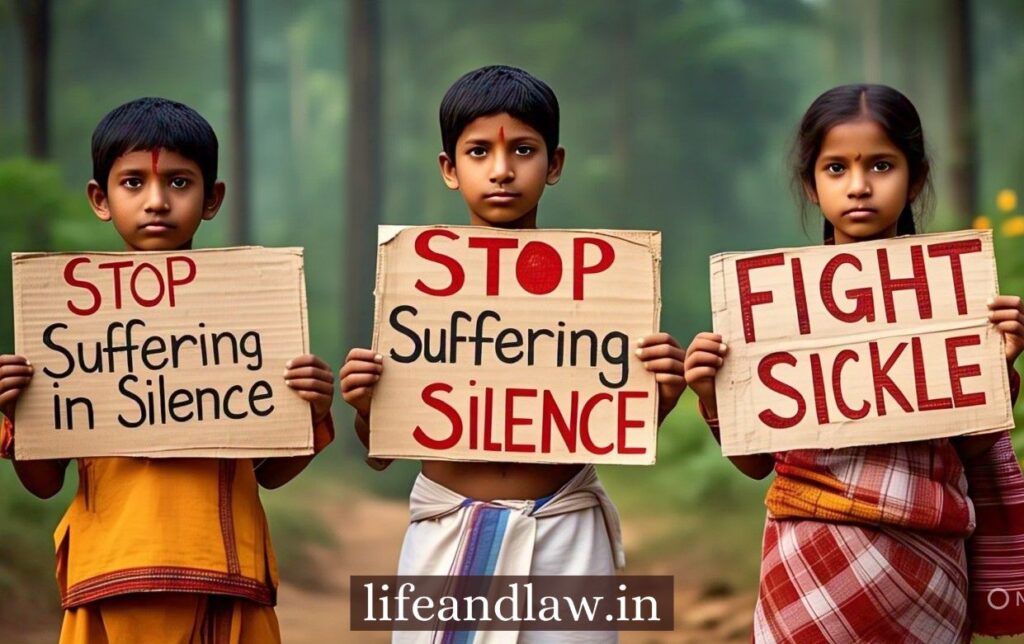Trending

Sickle Cell Disease (SCD) is a hereditary illness that affects millions of people worldwide, with an especially high incidence in India, particularly among tribal groups. As we mark World Sickle Cell Awareness Day on June 19, it is critical not only to raise awareness about the medical elements of this devastating disease, but also to investigate the legal rights and protections available to people affected.
The purpose of this blog is to investigate the legal issues and rights of sickle cell patients in India, shining light on the gaps in legal frameworks and healthcare access that frequently make them vulnerable. By addressing these challenges, we seek to ensure that people with sickle cell disease have the justice, support, and dignity they need, both in terms of treatment and legal rights.
Sickle Cell Disease is a congenital blood illness in which red blood cells become abnormally crescent-shaped (or sickle), resulting in persistent discomfort, organ damage, and infections. While SCD affects people all around the world, it is most common in India’s tribal areas, where the disease is prevalent due to a high rate of consanguineous marriages.
The disease imposes a great strain not only on the individual but also on their family, necessitating lifelong care, frequent hospitalizations, and severe mental and financial stress. However, despite the obvious need for specialized care and protection, India’s legal and healthcare systems are frequently insufficient to ensure fair treatment for people living with SCD.
Article 21 of the Indian Constitution provides essential rights, including the right to life and personal liberty. This might be taken as meaning that every citizen, including individuals with sickle cell disease, has the right to basic healthcare and dignity. However, in actuality, many sickle cell sufferers continue to face discrimination and neglect when seeking healthcare treatments.
The Rights of Persons with Disabilities Act, 2016 provides one of the most significant legal protections, recognizing a variety of medical problems as disabilities. Sickle cell illness, with its chronic and severe character, frequently qualifies under this statute, granting affected individuals access to rights such as educational, job, and government benefits. Furthermore, under the National Trust Act, 1999, the government supports the care, treatment, and rehabilitation of people with disabilities, which includes sickle cell disease.
Access to healthcare is one of the most significant issues for sickle cell sufferers in India. The government has made progress in strengthening healthcare services, but considerable gaps still exist, particularly in rural and tribal areas. For example, government initiatives such as the National Program for Prevention and Control of Sickle Cell Disease seek to provide genetic counseling, diagnosis, and treatment. Despite this, awareness and availability of resources vary, leaving many patients without proper care.
India’s Right to Health is enshrined in the Constitution, but its actual implementation remains a difficulty. To avoid complications, sickle cell patients require quick access to drugs such as hydroxyurea, blood transfusions, and pain treatment. However, access to these treatments is frequently hampered by financial constraints, geographical distance, and a scarcity of trained medical practitioners. Furthermore, the subject of health insurance is especially urgent. Many insurance companies do not recognize sickle cell disease as a legitimate ailment, leaving families financially vulnerable during medical emergencies.
Aside from medical and healthcare access, sickle cell patients in India endure significant social stigma and discrimination. This is especially noticeable in rural regions, where a lack of understanding leads to misconceptions and anxiety about the disease. People with sickle cells may be excluded from social and educational possibilities, as well as employment.
Legal assistance and human rights organizations can play an important role in addressing these societal concerns. They help to ensure that sickle cell patients are not refused access to school, employment, or public services because of their condition. Legal frameworks that clearly ban discrimination, education, employment, and healthcare are critical to protecting the rights of people with SCD.
Although sickle cell illness has received little attention in Indian courts, some judicial interventions have had an impact. Courts have ruled in favor of people with chronic illnesses in circumstances where the denial of medical treatment or educational possibilities was deemed discriminatory. Such decisions underscore the need for a stronger legal framework that clearly specifies the rights of sickle cell patients.
The fight for sickle cell patients’ rights in India is continuing, and while considerable progress has been made in healthcare and legal institutions, more work remains to be done. As we commemorate World Sickle Cell Awareness Day, we must push not only for improved medical care, but also for stronger legal safeguards and social rights for individuals impacted by the condition.
Author‘s platforms such as http://www.asmlegalservices.in. and http://www.lifeandlaw.in are dedicated to assisting people with legal advisory for awareness about legal rights of patients suffering from chronic illnesses such as sickle cell disease. By offering legal advice and promoting awareness, Adv. Abdul Mulla hopes to empower patients and guarantee they obtain the justice they deserve. Let’s work together to make our society more inclusive and equal for sickle cell patients.
Adv. Abdul Mulla (Mob. No. 937 007 2022) is a seasoned legal professional with over 18 years of experience in advocacy, specializing in diverse areas of law, including Real Estate and Property Law, Matrimonial and Divorce Matters, Litigation and Dispute Resolution, and Will and Succession Planning. read more….
Copyright BlazeThemes. 2025